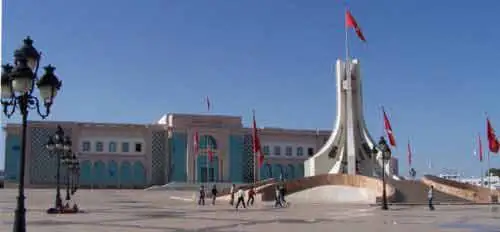Tunisia is an easy country where you can come and film without troubles, and citizens are very open to being filmed, and they have been doing that for years. With a lot of tax facilities and accessible airports and ports,. You simply need to get a film permit.
Tunisia is a small country with a variety of landscapes (sea, beach, forest, mountain, waterfall, desert, sand dunes, rocky desert, natural region, lake, river, plain, grassland, salt lake).

The Kasbah square in Tunis
Airport and customs
You need around 9 hours of driving to go from the northeast point (Bizerte governorate) to the southeast point of the country (Tataouine governorate).
Airport and customs
With more than 8 international airports, they serve the most important European, Mena region, and Canadian airports with direct flights.
With eight airports around the country, you can fly directly to your shooting location without needing to drive for long hours. Tunis is around 01 hour flying from Rome and Lyon and around 02 or 03 hours from almost all the European capitols.
In general using an ATA carnet helps save time when going through customs.
Taxes and cash
For local purchases, you need to pay the VAT (19%) since 2018. The foreign company are excluded from the general invoice taxes.
Most of hotels, rental car companies, and restaurants must accept the electronic cards Visa and Master Cards. Otherwise, the American Express is not very widespread in Tunisia. Anyway, you need to bring cash with you to pay for the small purchases. You can discuss that point with your fixer.
Archeological sites and museum
In Tunisia, you find Roman, Phoenician, Punic, and Islamic archeological sites; most of them have been UNESCO World Heritage of UNESCO since many years. Several museums are around the country; the most famous is the Bardo Museum based in the capital Tunis.
Climate and weather
Tunisia is an open-air film set. With a soft climate, a sunny and blue sky almost all the year, and the quality of the light. Endowed with a soft climate, Tunisia is filming friendly in summer and winter alike.
Religion
99% of Tunisians are Sunnite Maliki Muslims. The 1% left are split between Jewish and Christians, and most of them are foreign. You can find mosques all around the country; the most famous are the Uqba mosque and Zitouna Mosque. Cathedrals also exist all around the country; the most famous are the Cathedral of St. Vincent de Pau a Roman Catholic church; the Russian Orthodox Church in Tunis; and the Greek Orthodox Church in Tunis. SAINT FÉLIX Church in Sousse, a Catholic church, and many others. Synagogues exist in Tunisia, like the Great Synagogue at Tunis El Gheriba Synagogue in Djerba, and the Synagogue Keren Yéchoua in La Marsa, Tunis.
Crew and technician
Tunisia has very experienced technicians (English, French, and Italian) in all shooting departments.
Technicians have many years of experience with local and international shooting. Crews work six days a week, and the working day is nine hours with a one-hour break for lunch.
Casting
Tunisia has very talented actors of different ages and profiles, speaking different languages (English, French, Arabic, and Italian).
Also, with an experienced casting director and an updated casting database, you can find several Facebook groups and pages to help you in your casting for amateurs and beginners.
Extras
Due to the geographical position of Tunisia, the Tunisian population is a panoply of various civilizations. You can find almost all the human races: Arabs, Amazigh, “Berbers,” Europeans (blond hair and colored eyes), Asians, and blacks.
Visas and Work permits
Crews coming to Tunisia with Western passports don’t need a visa and can stay up to 90 days. No need for work permits to film in Tunisia. For more details about your passport and your eligibility for the visa, please visit this link.
